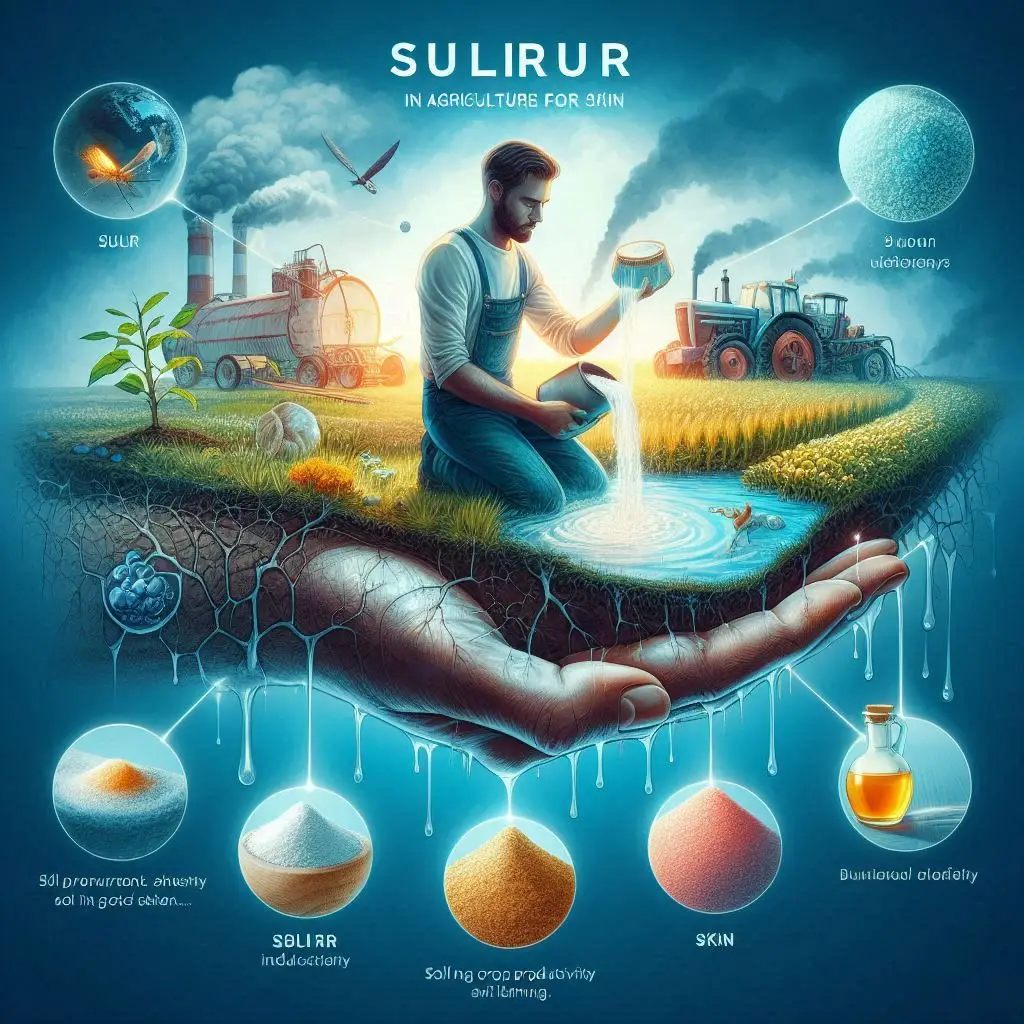
Sulfur uses in agriculture for skin
Introduction
Sulfur is a naturally occurring element with numerous benefits in both agriculture and skincare. It plays an essential role in enhancing soil health and crop productivity in farming, while also offering a range of skin benefits. This article delves into the multiple uses of sulfur in these two domains, explaining its crucial role in agriculture and its beneficial properties for skin health. Understanding these applications is key to harnessing sulfur's full potential in sustainable farming and effective skincare.
Sulfur Uses in Agriculture
Sulfur is an indispensable element in agriculture, offering a variety of benefits for soil and crop health. As an essential nutrient, sulfur plays a vital role in improving soil fertility and enhancing plant growth. Here’s how sulfur is commonly utilized in agriculture:
1. Soil Amendment
Sulfur is commonly added to soils that are deficient in this nutrient. It helps correct sulfur deficiencies, allowing plants to better absorb essential nutrients like nitrogen, phosphorus, and potassium. This ultimately leads to improved plant growth and higher crop yields.
2. Fungicide and Pesticide
Sulfur is also widely used as a natural fungicide and pesticide in agriculture. It is effective in controlling fungal diseases such as powdery mildew, rust, and leaf spot. Sulfur-based fungicides work by inhibiting the growth of fungal pathogens, reducing the need for synthetic chemicals. Additionally, sulfur has insecticidal properties, helping manage pests like mites and thrips, thus promoting healthier crops.
3. Fertilizer Production
Sulfur is a critical component in the production of various fertilizers. Ammonium sulfate and elemental sulfur fertilizers provide sulfur to the soil, which is essential for the synthesis of proteins, enzymes, and vitamins in plants. Sulfur-rich fertilizers are especially beneficial for crops like brassicas (broccoli and cabbage), onions, and oilseeds that have higher sulfur requirements.
4. Improvement of Soil Structure
Sulfur contributes positively to soil structure by promoting the formation and stability of soil aggregates. This results in better soil porosity, which enhances water infiltration and nutrient availability. Improved soil structure prevents soil erosion, making sulfur an essential element in maintaining soil health and agricultural sustainability.
Sulfur Uses for Skin
Sulfur is not only valuable in agriculture but also offers numerous benefits for the skin. Its antimicrobial, anti-inflammatory, and keratolytic properties make it an effective ingredient in treating various skin conditions. Below are some of the key ways sulfur is used in skincare:
1. Treatment of Acne
Sulfur is widely known for its effectiveness in treating acne. It possesses antimicrobial properties that help kill acne-causing bacteria on the skin. Additionally, sulfur reduces inflammation and prevents the formation of acne lesions. Many over-the-counter acne treatments include sulfur as a key ingredient due to its ability to clear breakouts and promote healthier skin.
2. Managing Skin Conditions
Sulfur is also beneficial for managing skin conditions like rosacea, seborrheic dermatitis, and eczema. Its anti-inflammatory effects help alleviate redness, itching, and irritation, making it a popular choice in topical treatments. Sulfur-based creams and ointments can provide relief from these conditions, improving skin texture and appearance.
3. Keratolytic Properties for Psoriasis and Eczema
Sulfur has keratolytic properties, meaning it helps break down keratin, a protein that contributes to rough, scaly skin. This makes it effective in treating conditions like psoriasis and eczema. Sulfur-based products help soften and smooth affected areas, offering relief from the discomfort associated with these skin conditions.
4. Regulation of Sebum Production
Excessive sebum production can lead to oily skin, clogged pores, and acne outbreaks. Sulfur helps regulate sebum secretion, promoting a more balanced complexion. By controlling oil production, sulfur helps maintain clear skin and prevents the recurrence of acne.
Conclusion
Sulfur is a versatile element with a wide range of applications in both agriculture and skincare. In farming, it enhances soil fertility, combats diseases and pests, and contributes to the production of essential fertilizers, making it vital for sustainable agricultural practices. Sulfur helps improve nutrient absorption, enhance soil structure, and boost crop yields, all of which are crucial for ensuring food security and healthy ecosystems. Moreover, its ability to manage fungal infections and pests naturally makes it an eco-friendly alternative to synthetic pesticides and fertilizers.
In skincare, sulfur’s antimicrobial, anti-inflammatory, and keratolytic properties make it a powerful treatment for acne, rosacea, psoriasis, and other skin conditions. By regulating sebum production and promoting cell turnover, sulfur helps keep the skin clear and healthy. However, it is important to use sulfur-based products with care, as overuse can lead to dryness and irritation, especially for individuals with sensitive skin.
Ultimately, sulfur's applications in both agriculture and skincare offer natural and sustainable solutions that support healthier crops and improved skin health. By understanding the benefits and proper usage of sulfur, both farmers and consumers can harness its potential to promote long-term health, productivity, and environmental responsibility. With the growing emphasis on sustainability, sulfur continues to be an indispensable resource in achieving balanced and effective agricultural practices while offering significant benefits for skincare routines.

